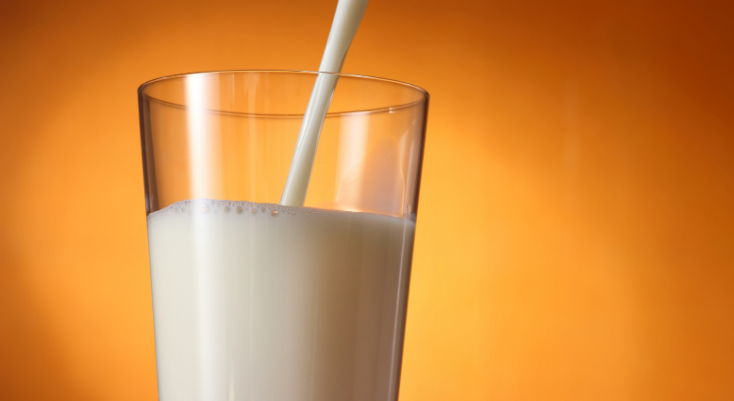Share this page
Facts about dairy nutrition and health
Find out more about the health benefits of dairy with our milk and dairy nutrition facts.

Milk is an excellent source of vitamins and minerals. Studies show that when consumed as part of a healthy diet, milk and dairy products contribute to better bone health and improve overall diet quality.
However, there is a lot of misinformation about dairy nutrition and health. Unfortunately, some people choose to avoid dairy products as a result, missing out on dairy’s many health and nutritional benefits.
Why are dairy products important for a balanced diet?
Dairy is an important part of a balanced diet. Milk and dairy products can be important sources of calcium, magnesium, selenium, riboflavin, vitamin B12 and pantothenic acid.
Consumption of dairy can bring important nutritional benefits to large segments of the population in developing and developed countries. Because of the important contribution dairy makes to nutrition, most countries recommend at least one serving of milk or milk products daily. Some recommend up to four servings each day.
Dairy is a highly nutritious food which provides:
- High quality protein: A glass of milk contains 8-10 grams of protein, about one-fifth the daily recommendation for a 135-pound person.
- Important minerals such as: calcium, iodine, phosphorus and potassium
- Vitamin B2, B5 and B12
Moreover, dairy is also great for muscle recovery and hydration after exercise, and some types of fermented dairy (like kefir and live yoghurt) contain probiotics which are great for our gut health.
Facts about dairy nutrition
There are a few misconceptions we often hear about dairy. For example, some consumers have become more concerned about saturated fat and as it is found in milk and dairy foods. It is sometimes assumed that dairy plays a role in the possibility of developing heart disease or type 2 diabetes.
Milk & dairy nutrition facts
Milk and dairy products are an excellent source of nutrition, and are associated with positive health benefits at all life stages. Here we look at some milk and dairy nutrition facts:
Fact: Dairy does not increase the risk of heart disease or type 2 diabetes.
- In fact, a growing body of scientific research shows that the consumption of milk and dairy foods has a neutral or protective association with the risk of developing heart disease and type 2 diabetes.
- Firstly, the role of saturated fat in heart disease has been questioned. Secondly, saturated fat is now known to be a ‘family’ of compounds, rather than a single entity, and research suggests some of these may not be detrimental to heart health. Lastly, it is more sensible to look at the effects of consuming a food, rather than the individual nutrients within that food, on disease risk.
- By simply looking at saturated fat and disregarding the complex interplay of nutrients and the variety of saturated fatty acids found in the dairy matrix, consumers are sent the wrong message about milk and dairy foods.
Fact: Milk and dairy have a positive impact on bone health at all life stages.
- Milk and dairy foods are important for healthy bones! Milk and dairy foods provide both the calcium and protein that bones need, in the right proportions. This makes milk and dairy an excellent food to consume throughout life to build and maintain strong bones.
- Bones store minerals such as calcium and phosphorous that help keep our bones strong. However, bones can become weak and break (fractures) or become porous and brittle (osteoporosis).
- There are many things that can help keep our bones healthy and strong, and the good news is that it is never too late to take care of your bones, by adding some dairy to your diet.

Dairy and plant-based foods
The unique and complementary roles of animal and plant-sourced foods in a sustainable food system requires a balanced approach.
Sustainable healthy diets are a balance between plant and animal-source foods. It is important to recognise the synergy between plant and animal foods – both have their place in healthy global diets.
It is also vital to recognise that plant-based beverages do not offer the same package of nutrients as milk.
Plant-based beverages are fortified and do not offer the same nutritional benefits as milk and milk products. Plant-based diets, complemented with animal-based foods, increases the variety and bioavailability of vitamins and minerals, and ensures a high-quality source of protein.
Learn more about dairy nutrition and health
The breadth of issues IDF covers in its work is extensive. Find out more about dairy nutrition and health.
Composition of milk and milk products
Dairy foods are an important source of nutrients both children and adults alike.
Read MoreDairy’s role in healthy eating patterns
Scientific evidence supports the importance of milk and dairy products as part of a healthy eating p...
Read MoreRelated reports & publications
IDF provides a permanent source of authoritative scientific and other information on a whole range of topics relevant to the dairy sector.
Related news & insights
IDF provides a permanent source of authoritative scientific and other information on a whole range of topics relevant to the dairy sector.
Nutrition symposium confirms important role of dairy in diets
IDF Symposium reviewing the latest science on the contribution of dairy in diets gathers several hundred health professionals from around the....
New bulletin advocates revised approach to lactose in dairy
Responding to a lack of evidence-based information about the important role of lactose as part of a healthy diet, IDF releases Bulletin 509/2021:....












